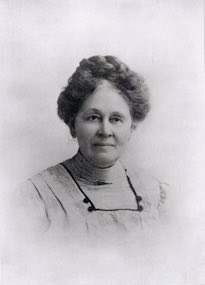Emma Smith DeVoe, as a leading suffragist in the early twentieth century, not only successfully ran the campaign that enfranchised women in the State of Washington ten years before the national amendment was ratified, but also helped transform the face of politics in America.
While DeVoe supported woman’s suffrage from her early childhood, her real impact came after she moved with her husband to Tacoma, Washington in 1905. She revitalized the near-defunct Washington Equal Suffrage Association and headed up the campaign that resulted in the approval, by a nearly 64 percent majority vote, of a constitutional amendment enfranchising Washington State women. A ladylike, polite, and tactful woman, DeVoe pioneered what she called the Washington plan of campaign. She advocated using “womanly” ways and one-on-one persuasion. She urged her fellow workers to see that women asked every voter in the state to support the suffrage amendment. Thus, DeVoe coupled the precinct method, introduced in Idaho’s 1896 campaign, with her new idea of a statewide canvass to determine how every voter stood on the question of suffrage. She also used other mass techniques, such as penny postcards and posters. She avoided alienating potent forces, such as big business and the brewers, by urging supporters like labor and temperance organizations to support the movement quietly rather than aggressively. She told her workers to remain “good-natured and cheerful.” And to prove that suffragists did not want to change women’s traditional role as homemakers, she published a cookbook that she distributed throughout the state, the back of which had the words “Votes for Women.”
After her victory in Washington, DeVoe campaigned in other states, advocating the Washington method rather than the more aggressive style of eastern suffragists who tended to imitate their British sisters with sit-ins and mass rallies. In addition, she organized the first national organization of voting women, the National Council of Women Voters, which studied issues to educate voters on a non-partisan basis. The organization’s “Declaration of Principles” proclaimed a dedication to holding itself above partisan politics and sectarian affiliations and instead working for equality of opportunity for all, the protection of children, and the promotion of the family. DeVoe’s council eventually merged with the National League of Women Voters.
As a suffragist, DeVoe not only brought new energy to the suffrage movement but also helped personalize politics and introduce the idea of voting the issues rather than the party.

